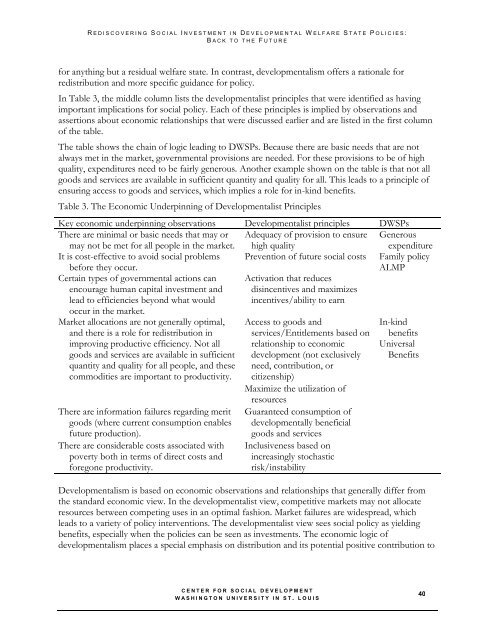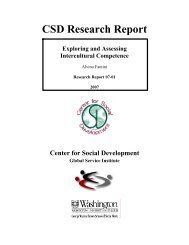Rediscovering social investment in developmental welfare state ...
Rediscovering social investment in developmental welfare state ...
Rediscovering social investment in developmental welfare state ...
You also want an ePaper? Increase the reach of your titles
YUMPU automatically turns print PDFs into web optimized ePapers that Google loves.
R E D I S C O V E R I N G S O C I A L I N V E S T M E N T I N D E V E L O P M E N T A L W E L F A R E S T A T E P O L I C I E S :<br />
B A C K T O T H E F U T U R E<br />
for anyth<strong>in</strong>g but a residual <strong>welfare</strong> <strong>state</strong>. In contrast, <strong>developmental</strong>ism offers a rationale for<br />
redistribution and more specific guidance for policy.<br />
In Table 3, the middle column lists the <strong>developmental</strong>ist pr<strong>in</strong>ciples that were identified as hav<strong>in</strong>g<br />
important implications for <strong>social</strong> policy. Each of these pr<strong>in</strong>ciples is implied by observations and<br />
assertions about economic relationships that were discussed earlier and are listed <strong>in</strong> the first column<br />
of the table.<br />
The table shows the cha<strong>in</strong> of logic lead<strong>in</strong>g to DWSPs. Because there are basic needs that are not<br />
always met <strong>in</strong> the market, governmental provisions are needed. For these provisions to be of high<br />
quality, expenditures need to be fairly generous. Another example shown on the table is that not all<br />
goods and services are available <strong>in</strong> sufficient quantity and quality for all. This leads to a pr<strong>in</strong>ciple of<br />
ensur<strong>in</strong>g access to goods and services, which implies a role for <strong>in</strong>-k<strong>in</strong>d benefits.<br />
Table 3. The Economic Underp<strong>in</strong>n<strong>in</strong>g of Developmentalist Pr<strong>in</strong>ciples<br />
Key economic underp<strong>in</strong>n<strong>in</strong>g observations Developmentalist pr<strong>in</strong>ciples DWSPs<br />
There are m<strong>in</strong>imal or basic needs that may or<br />
may not be met for all people <strong>in</strong> the market.<br />
Adequacy of provision to ensure<br />
high quality<br />
Generous<br />
expenditure<br />
It is cost-effective to avoid <strong>social</strong> problems<br />
before they occur.<br />
Prevention of future <strong>social</strong> costs Family policy<br />
ALMP<br />
Certa<strong>in</strong> types of governmental actions can<br />
encourage human capital <strong><strong>in</strong>vestment</strong> and<br />
lead to efficiencies beyond what would<br />
occur <strong>in</strong> the market.<br />
Activation that reduces<br />
dis<strong>in</strong>centives and maximizes<br />
<strong>in</strong>centives/ability to earn<br />
Market allocations are not generally optimal,<br />
and there is a role for redistribution <strong>in</strong><br />
improv<strong>in</strong>g productive efficiency. Not all<br />
goods and services are available <strong>in</strong> sufficient<br />
quantity and quality for all people, and these<br />
commodities are important to productivity.<br />
There are <strong>in</strong>formation failures regard<strong>in</strong>g merit<br />
goods (where current consumption enables<br />
future production).<br />
There are considerable costs associated with<br />
poverty both <strong>in</strong> terms of direct costs and<br />
foregone productivity.<br />
Access to goods and<br />
services/Entitlements based on<br />
relationship to economic<br />
development (not exclusively<br />
need, contribution, or<br />
citizenship)<br />
Maximize the utilization of<br />
resources<br />
Guaranteed consumption of<br />
<strong>developmental</strong>ly beneficial<br />
goods and services<br />
Inclusiveness based on<br />
<strong>in</strong>creas<strong>in</strong>gly stochastic<br />
risk/<strong>in</strong>stability<br />
In-k<strong>in</strong>d<br />
benefits<br />
Universal<br />
Benefits<br />
Developmentalism is based on economic observations and relationships that generally differ from<br />
the standard economic view. In the <strong>developmental</strong>ist view, competitive markets may not allocate<br />
resources between compet<strong>in</strong>g uses <strong>in</strong> an optimal fashion. Market failures are widespread, which<br />
leads to a variety of policy <strong>in</strong>terventions. The <strong>developmental</strong>ist view sees <strong>social</strong> policy as yield<strong>in</strong>g<br />
benefits, especially when the policies can be seen as <strong><strong>in</strong>vestment</strong>s. The economic logic of<br />
<strong>developmental</strong>ism places a special emphasis on distribution and its potential positive contribution to<br />
C E N T E R F O R S O C I A L D E V E L O P M E N T<br />
W A S H I N G T O N U N I V E R S I T Y I N S T . L O U I S<br />
40
















